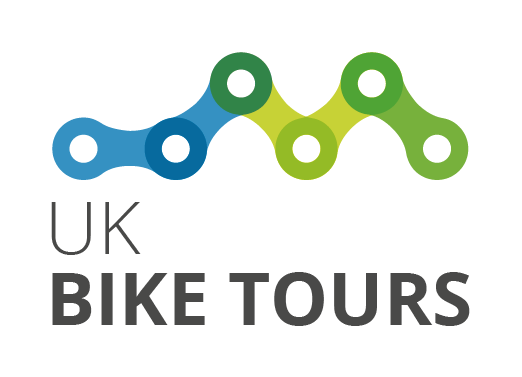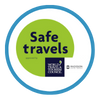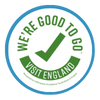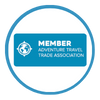We are local experts who offer self-guided cycling holidays in the UK covering all levels of ability and all ages from 8-88 years old. We will take care of everything: accommodation, bike rental, itineraries and luggage transport.
Operating Practices for Cycling in the UK
Introduction
COVID-19 represented the biggest challenge to the travel sector in nearly 20 years. As we have began to move towards the post-pandemic period and the resumption of operations and re-opening, the health & safety of our customers, staff, and partners (especially the accommodations) remains not only paramount but with a greater degree of precautionary measures required.
These set of practices and procedures have been prepared drawing on published guidance from various authorities including Event Safety Alliance, World Travel and Tourism Council, US Travel Association, UK Government and the NHS / Public Health England (PHE).
In preparing for the re-opening, we contacted accommodations to survey their adaptations and requirements of us. These have been incorporated into these procedures, where appropriate.
The procedures have also been designed to be consistent in the approach to safety the customer will experience across their travel journey. This document provides the detail to ensure compliance with all mitigating actions identified in the company COVID-19 risk assessment.
As we begin 2022, the situation is still evolving and our policy and guidelines may adapt in order to stay aligned to government rules and health authority recommendations. Please contact us if you have any particular questions on the situation.
Objectives:
- To ensure the health and wellbeing of our customers, staff and stakeholder partners remains at the core of how we operate.
- To reduce risk for staff and customers to the lowest reasonably practicable level by taking preventative measures.
- To ensure we operate at the forefront of industry best practices and in full compliance with the Safe Travel accreditation.
The guidance may, of course, evolve and be updated as the country moves through different stages of reopening, as the science and data become clearer, and as the known effectiveness of certain practices progress. As it does, these procedures may be updated accordingly.
The guidelines do not specifically cover the measures accommodations take. These are set out by the government and Visit Britain, with all the accommodation we use holding the Good to Go certification.
It must be noted that these protocols place responsibilities both on the company, individual members of staff and the customer.
Guiding Principles
- To maintain very high quality of customer experience and operational delivery
- All staff are briefed and trained on the new operating procedures.
- Weekly reviews of implementation and a process of continual improvement and development as more knowledge and guidance about COVID-19 becomes published by Public Health England.
- Established with the accommodation and any other key supplier and partners that they follow like-minded health and hygiene protocols and guidelines to protect guests. We advise them in developing their own protocols if they wish.
- All appropriate equipment and training is provided to all staff. The training is informed by the latest advice from PHE and/or WHO.
- Individual determination of personal risk without prejudice
- The risk rating may vary according to the individual’s circumstances. For example, sharing a household with a person identified as clinically vulnerable.
- Creating and Maintaining Barriers to Transmission
- Reinforcing hand hygiene which can decrease the risk of transmission of respiratory viruses by ~50%;
- Utilizing personal protective equipment (PPE) such as masks and gloves
- Maintaining Physical “Social” Distancing
- Installing physical barriers, such as transparent screens to provide proper separation between driver and customers
- Thinking creatively to limit staff physical contact with customers where practical while still delivering excellent service
- Educating both employees and customers about their shared responsibility
- Find touchless solutions, where practical, to limit the opportunity for virus transmission
- Contactless payment and no cash transactions
- Check-in
- Keyless entry
- Enhanced Sanitation
- More frequent hand washing by all staff and, in the absence of hand washing, make frequent use of an alcohol-based hand sanitizer (at least 60% alcohol)
- Sanitizing more frequently, using products and disinfectants that meet requirements for effectiveness against COVID-19; special attention to high-touch surfaces;
- Modified Vehicle Cleaning Regime and Personnel
- Increased Frequency of the Office Cleaning
- Promote Health Screening
- All employees must:
- Monitor own health
- Not work if are categorized in the higher risk or clinically extremely vulnerable categories (as defined by NHS).
- Not report to work if ill or showing signs of COVID-19
- Inform if they are not confident or happy with the measures or if they do not feel safe
- Self-isolate if showing symptoms of COVID-19, if awaiting test results, or if diagnosed with COVID-19.
- Use the NHS Track and Trace App
- All customers have a role to play as well and we communicate these responsibilities and guidance:
- Signage and information sheets
- Inform them NOT to travel if they are unwell or exhibiting symptoms nor if they have experienced these within 7 days of their holiday start date
- To use the NHS Track and Trace App
- Follow the measures taken by accommodation and UK Bike Tours
- All employees must:
- Established a set of procedures aligned with PHE guidance should an employee or customer test positive for COVID-19
- We will follow the official government guidance to define necessary actions in these instances
What This Means in the UK Bike Tours Office
- Physical Changes
- No more than 3 people in the office for more than 5 minutes at a time.
- To sit on opposite desks with backs to each other.
- Poster in front door informing visitor of their responsibilities.
- Poster in office reminding staff of the guidance & symptoms.
- Bell Cleaning Services contract amended to weekly visit
- Working Practices
Everybody works from home as much as possible. Equipment has been provided to enable this. When this is not feasible or possible (in particular due to the task in hand) then:
- Adjustment to working times to have separate shifts where feasible
- Only use own desk, PC, telephone, stationery
- Wear gloves when accessing cupboards and producing items for distribution – such as Info Packs
- Keep front door locked so that visitors/delivery drivers cannot just walk in
- Have a window open to allow flow of fresh air
- Put on face-mask if any visitors come to the office, ask them to put one on & keep them 1.5m away
- All staff to bring own drinking cups/bottles, cutlery and crockery. To wash up own items
- Info Packs and Goody Bags prepared at least 2 days in advance of distribution and then placed in relevant container so that it is not handled again before dispatch
- Wash hands after handling goods
- If a physical Team Meeting is Required – to hold either around meeting table maintaining 1.5m distance OR hold as Outdoor Meeting (also at 1.5m distance)
- Every 2hrs, to go for a 5-10min walk outside
- Weekly review
- Personal Hygiene Practices
- Wash hands regularly using soap and water for 20 seconds and particularly after blowing their nose, sneezing or coughing (or use suitable handgel if not able to access soap and water)
- Toilet Usage – after washing hands use the wipes provided to wipe toilet flush, seat and taps. Dispose of wipes and then rewash hands
- Bring own towel and remove each day. Do not use any other towel. Each staff member to have their own labeled towel peg and storage box
- In the event of not sourcing paper towels - separate towels for visitors. Washed each night
- Cover any coughs or sneezes with a tissue, then dispose of the tissue in a covered bin and immediately wash hands
- Frequently clean and disinfect objects and surfaces that are touched regularly
- Disinfect own workspace and items daily before leaving office and upon entering office
What This Means For A Customer Falling Ill with Suspected COVID-19 on Holiday
We follow the WHO guidelines - https://www.ukha.co.uk/uploads/images/COVID-19/WHO-2019-nCoV-Hotels-2020.2-eng.pdf
- In order to minimise the risk of contaminating other guests or members of the staff, symptomatic customers should leave according to instructions from the management of the establishment and local health authority
- If there is no other option but to keep a sick guest suspected of COVID-19, with mild symptoms, self-isolation in the room must be considered
- Identification of contacts should begin immediately after a suspected case has been identified in the establishment. WHO defines a contact as a person who experienced any one of the following exposures during the 2 days before and the 14 days after the onset of symptoms of a probable or confirmed case:
- Face-to-face contact with a probable or confirmed case within 1 meter and for more than 15 minutes;
- Direct physical contact with a probable or confirmed case;
- Direct care for a patient with probable or confirmed COVID-19 disease without using proper personal protective equipment; OR
- Other situations as indicated by local risk assessments.

Expert Team

Trip Notes & Maps
All of our trips are carefully designed by our team to provide you with the best cycling routes. We offer easy-to-use, up-to-date route notes and maps. Enjoy cycling on comfortable and peaceful routes!

Sustainability
Cycling is amongst the lowest-impact ways to travel, supporting local communities and helping reduce the impact of mass tourism. We are proud to be a Travelife Partner and are working towards Travelife Certified as part of our ongoing sustainability commitment.

Travel App
We know that taking a self-guided trip for the first time can generate insecurity, but with our app you can follow from your mobile and in an intuitive way the daily routes of your cycling trip. Our mobile app will also show you points of interest along your route.









